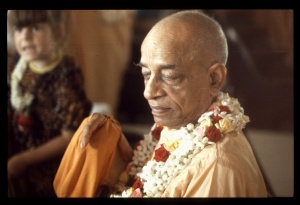BG 10.6 (1972)

A.C. Bhaktivedanta Swami Prabhupada
TEXT 6
- महर्षयः सप्त पूर्वे चत्वारो मनवस्तथा ।
- मद्भावा मानसा जाता येषां लोक इमाः प्रजाः ॥६॥
- maharṣayaḥ sapta pūrve
- catvāro manavas tathā
- mad-bhāvā mānasā jātā
- yeṣāṁ loka imāḥ prajāḥ
SYNONYMS
maharṣayaḥ—the great sages; sapta—seven; pūrve—before; catvāraḥ—four; manavaḥ—Manus; tathā—also; mat-bhāvāḥ—born of Me; mānasāḥ—from the mind; jātāḥ—born; yeṣām—of them; loke—the planets; imāḥ—all this; prajāḥ—population.
TRANSLATION
The seven great sages and before them the four other great sages and the Manus [progenitors of mankind] are born out of My mind, and all creatures in these planets descend from them.
PURPORT
The Lord is giving a genealogical synopsis of the universal population. Brahmā is the original creature born out of the energy of the Supreme Lord known as Hiraṇyagarbha. And from Brahmā all the seven great sages, and before them four other great sages, named Sanaka, Sananda, Sanātana, and Sanatkumāra, and the fourteen Manus, are manifest. All these twenty-five great sages are known as the patriarchs of the living entities all over the universe. There are innumerable universes and innumerable planets within each universe, and each planet is full of population of different varieties. All of them are born of these twenty-five patriarchs. Brahmā underwent penance for one thousand years of the demigods before he realized by the grace of Kṛṣṇa how to create. Then from Brahmā, Sanaka, Sananda, Sanātana, and Sanatkumāra came out, then Rudra, and then the seven sages, and in this way all the brāhmaṇas and kṣatriyas are born out of the energy of the Supreme Personality of Godhead. Brahmā is known as pitāmaha, the grandfather, and Kṛṣṇa is known as the prapitā-maha, the father of the grandfather. That is stated in the Eleventh Chapter of the Bhagavad-gītā. (BG 11.39)